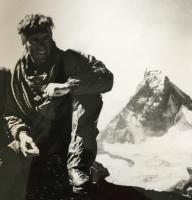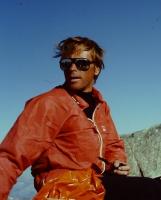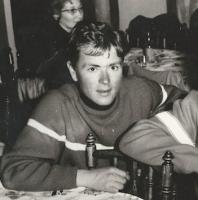Michel Zufferey was born on 7 March 1944 in St Luc, a village perched in the Swiss Alps. He went to the local grade school for several years and completed his compulsory schooling in Sion, down in the valley. After high school he enrolled in the University of Lausanne, where he earned a bachelor’s in sociology in 1970. In late 1971, he spent several months in the UK learning English.
Michel was born in the mountains, and the mountains remained a part of him throughout his life. But it was a fraught relationship: when Michel was only four years old his father – a seasoned mountain climber – died in a storm while returning from a difficult ascent of the Matterhorn. His father’s death, however, did not deter Michel from his passion for the mountains: in 1965 he qualified as a ski instructor, and the following year he completed the extremely rigorous course required to become a mountain guide.
When Michel applied for a job with the ICRC in 1972, his intention was to work as a mountain guide in the summer months and go on assignment in the winter – a reasonable plan given our staffing needs at the time. Although he never had a permanent contract, Michel ended up working with the ICRC nearly non-stop for a good ten years, not counting an 18-month break in 1980–1981 when he returned to the Alps to maintain his credentials as a mountain guide.
Michel’s first assignment was in Bangladesh from October 1972 until September 1974. He worked mainly with the Bihari people, who had settled in makeshift camps following the country’s independence from Pakistan in 1971. This was Michel’s first exposure to the aftermath of war, and he focused his considerable energy on securing government guarantees for the Biharis’ safety, ensuring they received food and other aid, tracing missing people and repatriating others, and helping the Biharis assimilate through education and training. Michel proved to be a hard worker with an excellent ability to relate to the people he was serving. He also showed that he could operate with little oversight and under highly demanding conditions.
His next ICRC assignment was to Angola, where, from August 1975 to April 1976, he helped run relief activities for Angolan refugees in the wake of the country’s war of independence. During this time Michel was noted for his self-possession, such as during an extremely tense standoff between UNITA and Portuguese forces in which he negotiated the release of women, children and the elderly.
The next stop for Michel was Beirut, from April to August 1976. In that posting he was tasked with opening a subdelegation in Jounieh, just north of the Lebanese capital. This was his most challenging assignment to date, not least for the perseverance required to evacuate the wounded from the heavily besieged refugee camp of Tel al-Zaatar on the outskirts of Beirut. It was an experience that took its toll on Michel.
After a two-month break, Michel was sent to the Sinai Peninsula, which was then in Israeli hands. He spent much of his time there – from October 1976 to February 1979 – with the Bedouin community. It was a relatively solitary mission, in which Michel excelled. He was held in such high esteem by the local community that, when his assignment came to an end, a group of Bedouin leaders wrote to the ICRC asking not to be deprived of their delegate.
Michel followed this up with a special mission to Pakistan, where he headed the ICRC’s delegation in Peshawar from February to November 1980. At least one observer commented on the respect Michel commanded from Afghan fighters and Pakistani government officials alike. Then came his 18-month hiatus during which he renewed his mountain guide permit. Returning to the ICRC in May 1982, Michel did another short stint as head of delegation, this time in Abéché, Chad. For six months, he toiled in what can only be described as rudimentary living conditions.
In January 1983, the ICRC posted Michel to Khartoum, Sudan. The delegation there served in part as a base for the relief services being provided in the Tigray region of Ethiopia – a country mired in civil war and suffering a crushing famine. Drawing on his characteristic physical and moral fortitude, Michel threw himself into his work, distributing food and medical supplies despite the constant threat of attack from government forces on Tigray separatists. On 5 January 1985, when Michel was ostensibly out of harm’s way, he was killed in a car accident near Wad Madani, Sudan. He was 40 years old.
Michel was a quintessential mountaineer – tough, taciturn and modest, yet generous and willing to risk life and limb to help those in need. He ultimately spent little time in his beloved Alps, as humanitarian work became his mountain and he one of its tireless guides.


